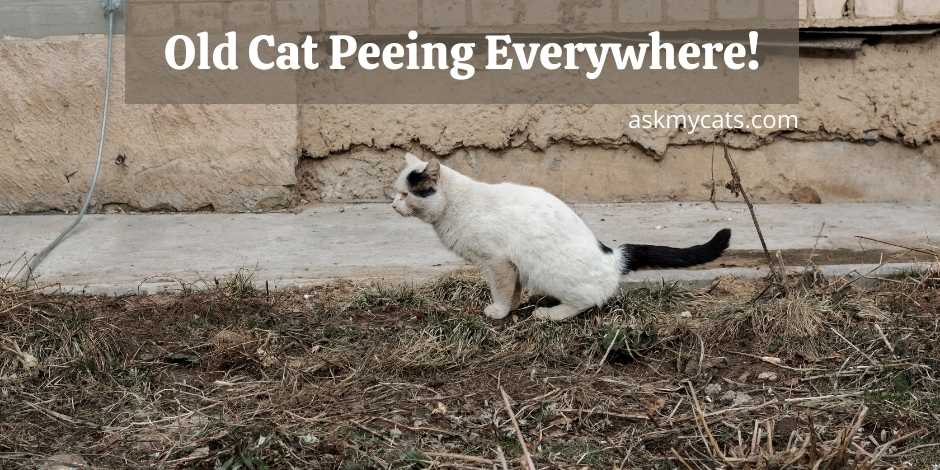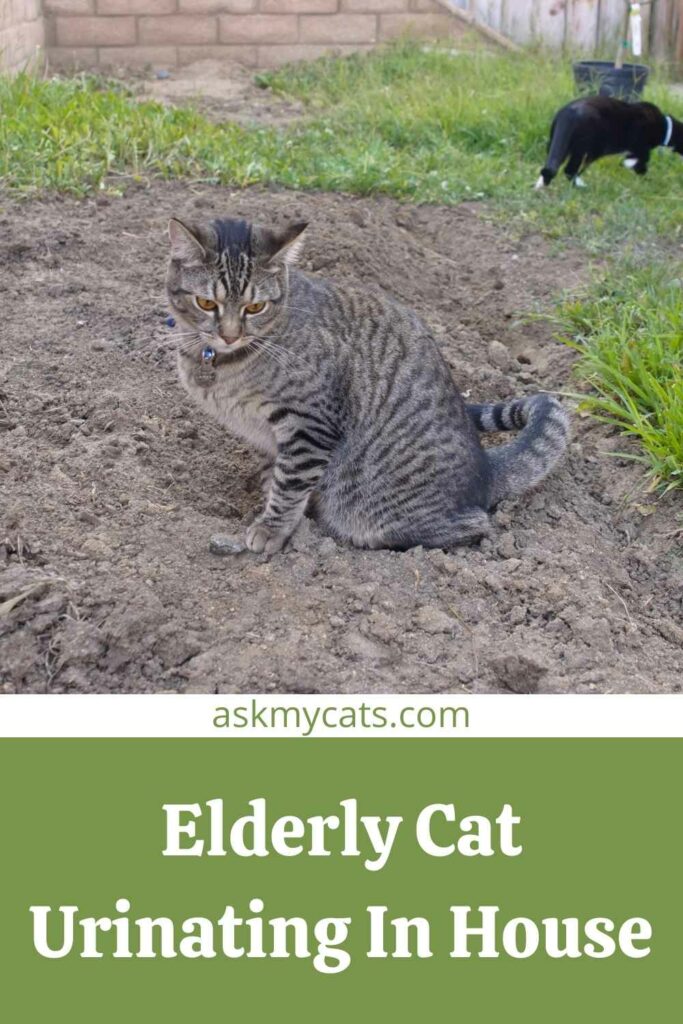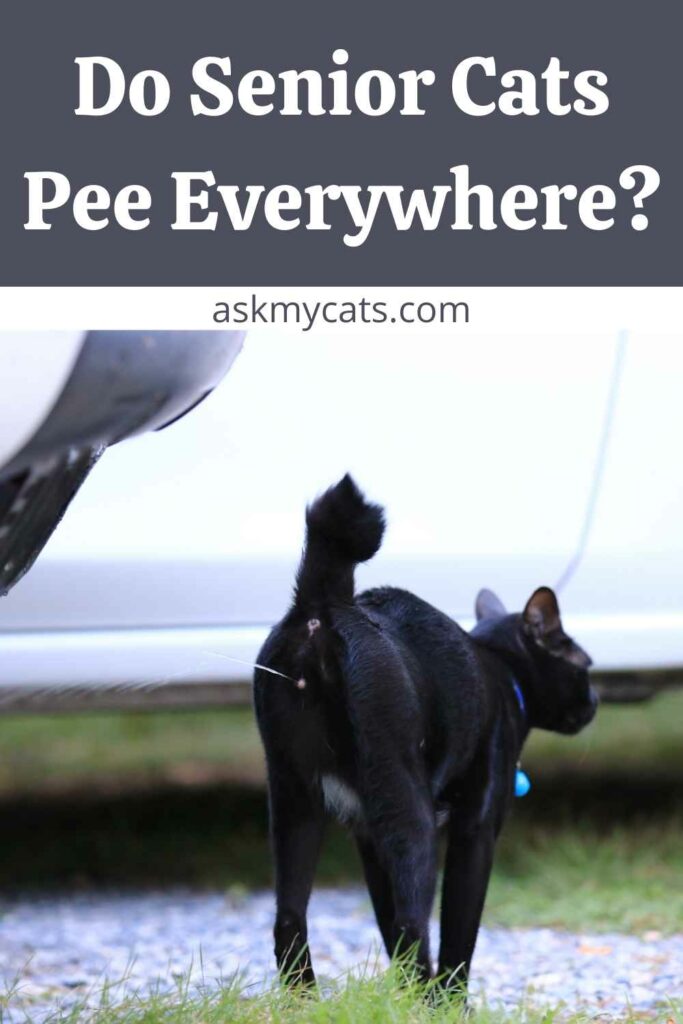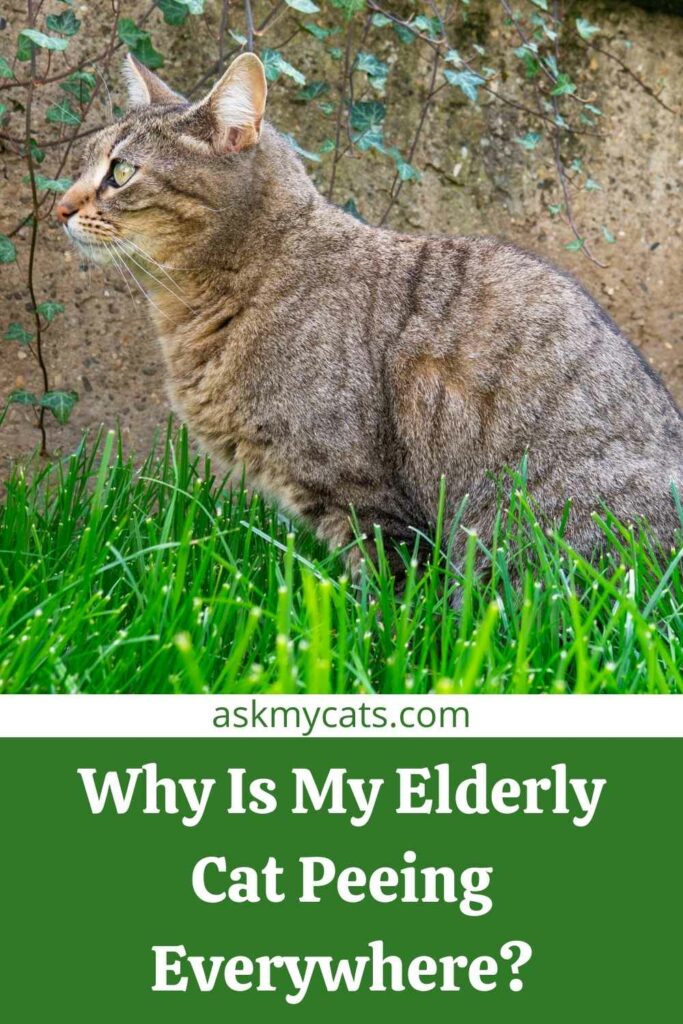Urinary problems are prevalent in cats, and inconvenient urination may be so distressing for cat owners that they consider rehoming their pets.
You should know that there is still hope for your pet before you continue down this path. You may not only learn how to effectively deal with urine problems in your cat, but you can also learn how to avoid some urinary problems from occurring in the first place.
Generally, there are only two possible causes for your cat peeing everywhere: a medical problem or a behavioral problem.
We’ll look at the reasons for these problems, as well as what you can do to help your cat, in this post. Let’s get this discussion started!


Give Your Cat the Perfect Day
Get the Free Ebook!
Elderly Cat Urinating In House
Your elderly cat is urinating everywhere in the house because he doesn’t like the litterbox to pee.

It’s concerning, to say the least when your senior cat (or any cat, for that matter) that is normally meticulous about using its litter box suddenly starts peeing all over the house. Cat pee is very fragrant, and the stench of cat urine may quickly pervade your entire home.
This habit is incredibly worrying for cat owners, and you may begin to wonder about what has suddenly gotten into your cat, aside from the aggravation of continuously cleaning a stinky mess.
Although there is occasionally something more serious at hand, the fundamental reasons and answers to this problem are quite straightforward to uncover.
If a medical explanation for your cats improper urinating cannot be determined, it’s critical to figure out what elements are driving your cat to act this way.
Cats are picky about where they go to the bathroom. It’s possible that your cat’s litter box is simply too filthy for him. It might also be absolutely clean yet inconvenient to use.
Your cat’s box, for example, maybe too tiny for him to use comfortably. It might also be at an area that your cat dislikes.
This may irritate your cat if it is coated. Perhaps the litter has a strong odor or makes your cat’s paws feel irritated. Cats need variety, so having too few litter boxes might be a problem.
Your cat may be attempting to communicate with you that it is stressed at home. It’s possible that it’s dissatisfied with another animal in the house and is marking its territory to communicate with them.
If the other animal is out and about, your cat may decide that accessing the litter box is too dangerous. If there is a new person in the house, your cat may “act out.”
Cats are extremely sensitive to even little changes in their surroundings. Whatever the reason for your cat’s agitation, make sure it has a peaceful spot to retreat to. This haven of refuge should not be accessible to the new animal or person.
You might like to know about why did my cat pee on me
Do Senior Cats Pee Everywhere?
If senior cats do not find the litterbox to be suitable to pee, then they will start peeing here and there.

If your cat has peed in an area, the odor may linger long after you have cleaned up the mess. The sense of smell of a cat is far superior to yours. If you have old urine scents in your house, there’s a significant possibility your cat may return because of the stench.
It’s time to take your cat to the vet if he’s peeing all over the place. This isn’t normal behavior, and the kitten is indicating that something is wrong. Cats are excellent at hiding their discomfort from people, but peeing outside the box is something you will notice and address.
Your veterinarian will assist you in figuring out why your cat is peeing all over the place. Your cat’s vet will most likely check for a urinary tract infection, bladder infection, renal problems, diabetes, or a variety of other ailments.
Only a veterinarian can determine whether there is an underlying medical cause for your cat urinating outside the box, so get the cat carrier out and bring her in if you notice her doing so.
It might be a sign of separation anxiety if your cat is urinating on your bed, pillows, or clothes while you are gone. Consult your veterinarian or a cat behavioral specialist for advice on how to make your cat feel safer. Medication, adjustments in your cat’s playtime, acquiring her buddy, and other strategies might help.
Also, make sure that whoever is caring for your cat while you are away following particular routines and keeps the litter box clean. Changes in schedule and surroundings, as previously said, may aggravate stress and pee outside the litter box.
Once the underlying pressures that cause anxiety are under control, most cats resume regular litter box usage.
Why Is My Elderly Cat Peeing Everywhere?
Your elderly cat is peeing everywhere because he is facing troubles and issues while urinating.

You may believe that because your cat has always been good about using the litter box, they are now immune to behavioral concerns, but this is just not the case. Several factors might lead your cat to deviate from its normal routine and develop new behavioral issues.
The litter box is filthy. Although it may seem self-evident, the first item to look for is a clean litter box for your cat. Cats are famously picky creatures, especially when it comes to their bathrooms and as they become older, even a little filthy litter box may prompt them to go somewhere else.
Keeping their litter box as clean as possible at all times may help to resolve the problem.
The litter box must be changed. If you switch to a different type of litter box or litter, your cat may pee all over the house. They may not like the new design of the box or the scent of the litter, or they may find it difficult to get into the box due to their aged body.
Give your cat a variety of litter boxes to choose from, as cats appreciate having options. It’s possible that the new purchase has put them off if they’re still using the old box or litter.
Senior cats, in particular, appreciate regularity and doing things their own way. Peeing all over the house might be the result of a sudden shift or interruption in their routine.
Moving to a new home, bringing a new pet home, having a sudden influx of visitors, or even hearing unusually loud noises can all trigger stress in your cat?
Something particular may have caused their worries when using their litter box, and they are now reluctant to use it again. Try to pinpoint the source of stress in your cat’s life and take the appropriate actions to alleviate, stop, or acclimate them to it.
Finally, cat owners are familiar with the lasting, powerful odor of cat urine, which may be quite difficult to eradicate depending on where it is located.
If your cat has started avoiding the litter box for any of the reasons listed above, it’s likely that their keen sense of smell has picked up the remaining pee stench on the carpet or sofa, and they’ve decided that this is a perfect litter box substitute!
If this is the case, you may need to have your carpet professionally cleaned to completely eliminate the stench, and you should keep your cat out of the area for as long as possible until the smell is gone.
Why Is My Senior Cat Peeing Outside The Litterbox?
Your senior cat is peeing outside the litterbox because he doesn’t find the litterbox attractive enough.
Your cat’s dislike of the litter box might be due to medical concerns that you haven’t discovered yet – cats are masters at concealing disease. If their litter box is clean and they aren’t stressed, there might be an underlying medical problem, and you should take your cat to the doctor for a checkup.
Urinary disorders can easily escalate into more serious problems, especially in older cats, so if you see any signs of pain or discomfort when your cat is peeing, schedule an appointment with your veterinarian right away.
Why Do Old Cats Stop Using The Litterbox?
Old cats stop using litterboxes because of medical issues and diseases.
Your aged cat may find it difficult to access their litterbox due to arthritis or another sort of severe degenerative joint condition, and they’ll simply go where it’s easiest.
Make sure their litterbox has low sides that are simple to reach, is not located at the bottom or top of a lengthy flight of stairs, and that they have various litterbox alternatives throughout the house. Your veterinarian may also be able to give medicine to aid with some of the symptoms and suffering associated with certain diseases.
Bladder stones or bladder crystals, which are the precursors of bladder stones, can be excruciatingly painful for your cat, and this could be the source of their incontinence.
A urinary tract infection (UTI) is a very typical occurrence in elderly cats, and it is caused by bacteria in the urine that can create an inflammatory reaction, leading to a painful illness.
Your cat may identify this discomfort with their litterbox and, as a result, will seek out another location to relieve themselves. You’ll need to take your cat to the veterinarian, who will likely prescribe medication.
How Do You Stop An Old Cat From Peeing Everywhere?
If your cat is peeing all over the place and you’ve ruled out medical causes, it’s time to redesign your litter box setup.
To begin, make sure your cat’s litter box is as clean and appealing as possible. Choose the largest litter boxes you can and keep them exposed as much as possible. Your cat, especially if it’s a big or fluffy cat, may feel crowded within a covered box.
Place litter boxes in a residence that is both calm and accessible. Make sure they aren’t near your cat’s eating or drinking area. Consider using a decorative screen to divide the cat litter box location from other places for your cat’s privacy and your personal design.
In general, being a responsible, attentive cat owner is the key to preventing or eliminating improper urination in cats.
Maintain your cat’s health by taking him to the vet on a regular basis and as soon as any problems arise. Reduce stress in your cat’s habitat by attempting to maintain a cat-friendly, low-stress environment.
Frequently Asked Questions
How to Keep Old Cat from Peeing On the Carpet?
Ensure that their litter pan is large enough and that it is cleaned on a regular basis. Strongly scented cleansers should be avoided since cats have sensitive noses and dislike strong odors. When the area is clean and dry, apply FELIWAY Classic Spray. Spray the places where you don’t want your cat to spray once a day.
Why is my older cat peeing on my bed?
Cats pee on beds most often as a result of worry and tension, which can disrupt many hormonal and chemical balances in the body. To begin, see your veterinarian ensure that your cat does not have a bladder or urinary tract infection.
How to stop an old cat from urinating in the house?
Mix 16 ounces (500 mL) of warm water with 10 drops of peppermint essential oil or two teaspoons of peppermint extract in a spray bottle. Spray any locations where you suspect your cat has urinated or left a mark. The odor will dissipate in a few hours.
Final Words
While it’s natural for older cats to have medical or behavioral concerns that influence their toilet habits, there are things you can do to help them stop urinating all over your house or even avoid it.
You can simply prevent the scenario completely or nip it in the bud as quickly as possible by ensuring that their litter box is clean and kept in a quiet, tranquil location, keeping their life as stress-free as possible, and visiting the vet as soon as any difficulties arise.
